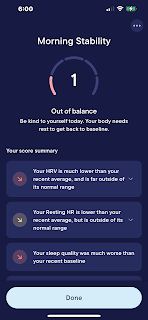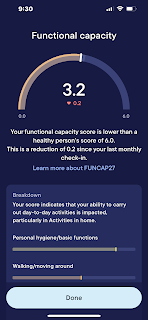I've lived with chronic illness and disability now for a while. Through the years I've tried many tools to help me with my fatigue and muscle weakness. Many modifications as well. Here are some things I have learned that have been helpful to me.
1. Give in to sleep. I used to fight my afternoon fatigue like my life depended on it. I felt I was "weak" for giving in and resting. No more. Unless it's very important (I'm on a special vacation that I really don't want to miss a moment of), I rest every day. For as long as I need. Typically between 2-3 hours in the afternoon. I always feel better for it.
2. Use a stick. Even if I think I don't need it. I'm very prone to tripping and my stick has saved my ass more than once.
3. Don't miss a dose. If I miss a dose of my medications I'm in hell. It's a very big deal with incredibly painful consequences. Now I let everyone I'm with know that and I set alarms. I never assume I'll just remember. Especially if my routine has changed and I'm out for the day.
4. I don't sweat "accomplishments." I used to feel huge pressure to "accomplish" as much as possible. To contribute something back to everyone and society. I let that shit go. Now I just do what I can.
5. Don't do standing what you can do sitting. Great advice. I try to remember this one as much as possible. Adding a stool to my bathroom was a game changer. I have low outlets there and a makeup mirror. Now I do all my bathroom grooming sitting down. A huge spoon saver.
6. Don't do it alone. I never go to any appointment alone if I can help it. I will always miss things that were said and the doctor's notes aren't always accurate either. But having my husband or my mom with me can not only help me remember what was said, but they can help advocate for me too if needed. Or help me remember things I was going to ask about (if I didn't write it down ahead of time.)
7. Keep good records. Keeping a list of all my doctors, their contact information and a list of my medication has been useful more than once. If I have questions going into an appointment I also try and send them ahead of time and bring it written down with me. I hang on to "after visit summary" sheets if it was an important appointment, if they gave me a referral or if it have medication changes on it that I need to remember.
8. Say "No." I'm still working on this one. I've gotten better about turning down things when I'm too tired, but I still can feel like a "flake" if it's too last minute. That also goes for modifying what I'm doing as I'm doing it. Leaving early, cutting outings short, etc...
9. Keeping things easy in the kitchen. Buying things pre-chopped (or getting my husband to do that part for me), having a food routine and having groceries delivered have all been helpful "tweaks" to how I used to do things in the kitchen. Also, using a stool when I cook is very helpful. Again... see #5.
10. Not putting pressure on myself. Period. This goes for sex, grooming, accomplishments, sleep, parenting... I tend to be an organized perfectionist, but that doesn't mesh well with the life of a chronic illness spoonie. My illness takes precedent and everything else comes second. It is the biggest part of me and demands to be accommodated. I try to keep that in mind of give myself grace.











